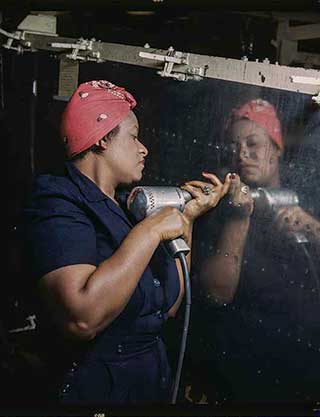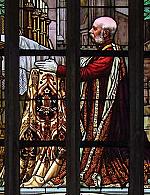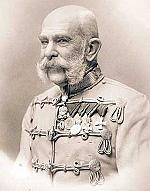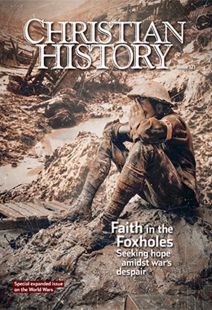World Wars, Did you know

[The real Rosie the Riveter—Library of Congress]
The vicar is a pacifist
G. A. Studdert-Kennedy (1883–1929), an English slum vicar who became a World War I chaplain, developed an unusual way to get the attention of troops—distributing Bibles and Woodbine cigarettes, earning him the name “Woodbine Willie.” Once he put up a post with the sign “The Vicarage.” Soldiers walking by commented, “Look—the bloody vicarage.” Studdert-Kennedy poked his head out and said, “And here’s the bloody vicar.” When he died at 46, he was so famous that King George V sent condolences. Some ex-soldiers sent a wreath, with a cigarette packet at the center, to the funeral.
Studdert-Kennedy won a medal for helping injured soldiers out of the line of fire, but the war turned him into a socialist, a pacifist, and a poet. He advocated for workers and penned Rough Rhymes of a Padre (1918), More Rough Rhymes of a Padre (1919), and The Unutterable Beauty (1927). Of his cigarette-dispensing days he wrote,
“Their name! Let me hear it—the symbol
Of unpaid, unpayable debt,
For the men to whom I owed God’s Peace,
I put off with a cigarette.”
Put it in your pipe and smoke it
One surprising World War II Bible use was as cigarette papers for POWs. Gavan Daws, in Prisoners of the Japanese (1994), wrote:
A Dutch Jesuit chaplain on Sumatra said the Word of God was sanctified, not the paper, so roll away. Sick men smoked their army-issue Bible after reading it. Or they smoked without reading, and about this the chaplains had nothing to say except that it was better for the men to get the Word in them by inhaling than not at all.
Order Christian History #121: Faith in the Foxholes in print.
Subscribe now to get future print issues in your mailbox (donation requested but not required).
For those who were willing to read before rolling, where should they start? An English chaplain said Revelation, which no one understood anyway. The Dutch Jesuit said the Old Testament, then the Acts of the Apostles because they were only practicalities, then the Gospels; leave the Sermon on the Mount for last, and learn it before smoking it.
They came for many people
Lutheran pastor Martin Niemöller (1892–1984) is famous for the statement “First they came for the Socialists. …” But when Niemöller first used the idea in a 1946 speech, he spoke at more length:
When the concentration camp was opened [in 1933] … the people who were put in the camps then were Communists. Who cared about them? We knew it, it was printed in the newspapers. Who raised their voice, maybe the Confessing Church? We thought: Communists, those opponents of religion, those enemies of Christians. … Then they got rid of the sick, the so-called incurables.—I remember a conversation I had with a person who claimed to be a Christian. He said: “Perhaps it’s right, these incurably sick people just cost the state money, they are just a burden to themselves and to others. “ … The persecution of the Jews, the way we treated the occupied countries, or the things in Greece, in Poland, in Czechoslovakia or in Holland, that were written in the newspapers. … We can talk ourselves out of it with the excuse that it would have cost me my head if I had spoken out.
More chaplain tales
Writer Lyle Dorsett found in his deceased uncle’s belongings a postcard saying that Private First Class Jack Dorsett “has been true to his Christian profession by participating in our Communion service. Our prayers mingle with yours for his continued devotion and faithfulness.” But not all soldiers kept faith. One Catholic chaplain wrote to an enlisted man’s wife that her husband was skipping Mass and “not attending to his religious duties. There is absolutely no excuse other than laziness or indifference.”
Jewish chaplain Milton Rosenbaum was in a trench in the Pacific when a marine asked for prayer. He began reciting the 23rd Psalm—soon joined by 12 Christian marines. And during the Battle of the Bulge, injured lieutenant Henry Cobb saw a priest racing into the embattled Ardennes forest from which Cobb had just come. “Where in the devil do you think you are going, Father? All hell is breaking loose up there,” Cobb asked. “That is why I need to be there,” the chaplain said. Cobb never saw him again. CH
This article is from Christian History magazine #121 Faith in the Foxholes. Read it in context here!
By the editors
[Christian History originally published this article in Christian History Issue #121 in 2017]
Some of the stories of World War II chaplains were found in Lyle Dorsett’s book Serving God and Country. Niemöller’s quote was translated by Harold Marcuse.Next articles
Editor's note: The World Wars
Heroic, fascinating, and troubling stories from the great wars
Jennifer Woodruff TaitThe crisis of the West
World Wars I and II proved to be more than a political crisis: they were a spiritual one
Jeffrey B. WebbSupport us
Christian History Institute (CHI) is a non-profit Pennsylvania corporation founded in 1982. Your donations support the continuation of this ministry
Donate







